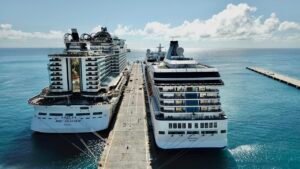Navigating cruise ports can make or break your vacation experience. This comprehensive guide covers everything you need to know about major cruise ports worldwide, from arrival procedures to local attractions.
Understanding Cruise Port Basics
Port Terminology
- Cruise Terminal: The main building where passengers embark and disembark
- Berth: Where the ship docks
- Port of Call: A stop along your cruise route
- Home Port: Where your cruise begins and ends
Common Port Facilities
- Check-in counters
- Security screening areas
- Luggage handling services
- Duty-free shops
- Information desks
- Currency exchange
- Basic medical facilities
Major Caribbean Ports
Miami, Florida (USA)
Port Facilities:
- World’s largest cruise port
- Multiple terminals with modern amenities
- Free Wi-Fi throughout
- Extensive parking facilities
Transportation:
- Taxi services readily available
- Hotel shuttles
- Public bus service
- Metrorail connection
- Ride-sharing pickup zones
Nearby Attractions:
- South Beach (20 minutes)
- Downtown Miami (15 minutes)
- Bayside Marketplace (10 minutes)
- Little Havana (15 minutes)
Nassau (Bahamas)
Port Facilities:
- Three main docking areas
- Shopping plaza
- Tourist information center
- Water taxi service
Transportation:
- Walking distance to downtown
- Horse-drawn carriages
- Local taxis (agree on price before riding)
- Jitney buses
Nearby Attractions:
- Straw Market (5-minute walk)
- Queen’s Staircase (15-minute walk)
- Paradise Island (10-minute water taxi)
- Cable Beach (15-minute drive)
Mediterranean Ports
Barcelona (Spain)
Port Facilities:
- Seven international terminals
- Free shuttle between terminals
- Shopping areas
- Restaurant options
Transportation:
- Port shuttle to Las Ramblas
- Metro station (15-minute walk)
- Official taxi rank
- Tourist bus stop
Nearby Attractions:
- Las Ramblas (10-minute drive)
- Sagrada Familia (20-minute drive)
- Gothic Quarter (15-minute drive)
- Barceloneta Beach (walking distance)
Civitavecchia (Rome, Italy)
Port Facilities:
- Free shuttle to port entrance
- Tourist information office
- Left luggage facilities
- Wi-Fi zones
Transportation:
- Train to Rome (80 minutes)
- Organized shore excursions
- Private transfers
- Local bus service
Nearby Attractions:
- Rome city center (1.5 hours)
- Vatican City (1.5 hours)
- Local beaches (10 minutes)
- Terme Taurine (ancient baths)
Port Safety and Tips
General Safety
- Always carry your cruise card and photo ID
- Be aware of port time (ship’s time may differ)
- Note emergency numbers
- Keep valuables in your cabin safe
Smart Planning
- Research ports before arrival
- Book official shore excursions or plan independent tours
- Carry local currency for small purchases
- Download offline maps
- Note ship’s location and boarding time
Transportation Tips
- Use official taxis or transport services
- Agree on fares before starting journey
- Keep ship’s contact information handy
- Allow extra time for return to ship
Special Considerations
Accessibility
- Most major ports offer wheelchair assistance
- Request special services in advance
- Check for elevator availability
- Consider distance to attractions
Weather Impact
- Monitor local weather forecasts
- Plan indoor alternatives for rainy days
- Consider seasonal closing times
- Pack appropriate gear
Conclusion
Understanding port facilities and planning ahead can significantly enhance your cruise experience. Each port offers unique characteristics and challenges, but with proper preparation, you can maximize your time in each destination while ensuring a smooth and enjoyable visit.
Quick Port Checklist
- Research port location and facilities
- Plan transportation in advance
- Note ship’s all-aboard time
- Carry essential documents
- Have local currency ready
- Save emergency contacts



